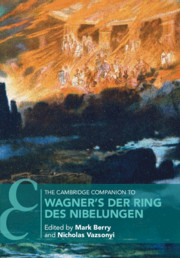Book contents
- The Cambridge Companion to Wagner’s Der Ring des Nibelungen
- Cambridge Companions to Music
- The Cambridge Companion to Wagner’s Der Ring des Nibelungen
- Copyright page
- Contents
- Figures
- Music Examples
- Contributors
- Preface
- Abbreviations
- Introduction
- Part I Myth
- 1 Greek Tragedy and Myth
- 2 Wagner and the Rise of Modern Mythology
- Part II Aesthetics
- Part III Interpretations
- Part IV Impact
- Bibliography
- Index
2 - Wagner and the Rise of Modern Mythology
from Part I - Myth
Published online by Cambridge University Press: 18 September 2020
- The Cambridge Companion to Wagner’s Der Ring des Nibelungen
- Cambridge Companions to Music
- The Cambridge Companion to Wagner’s Der Ring des Nibelungen
- Copyright page
- Contents
- Figures
- Music Examples
- Contributors
- Preface
- Abbreviations
- Introduction
- Part I Myth
- 1 Greek Tragedy and Myth
- 2 Wagner and the Rise of Modern Mythology
- Part II Aesthetics
- Part III Interpretations
- Part IV Impact
- Bibliography
- Index
Summary
Since the Renaissance, artists introduced imaginative narratives to complement, or even replace, the Christian stories that functioned to shape society. They tried to introduce new mythologies. Despite the danger of encountering criticism from rationalists, as well as the threat of being absorbed by commercialism, some mythologies managed to gain influence in modern societies. Wagner’s venture, undertaken in an era no longer dominated by theology, but also not yet favored by “mythophile” psychology and spirituality, is arguably the most successful of them all. This chapter analyzes the ingredients of the success for the narrative to become a forceful mythology in the nineteenth century. This includes the ideology of humanism, the romantic idea of myths as symbolic narratives, Feuerbach’s idea of gods as signs of human alienation, Nietzsche’s view of Wagner’s Ring as an instance of anti-intellectualism, and the interpretation of the opera as at its core a socialist work of art. According to the author, the Ring should be conceived of as a special type of modern myth, namely a revolutionary myth.
- Type
- Chapter
- Information
- Publisher: Cambridge University PressPrint publication year: 2020

